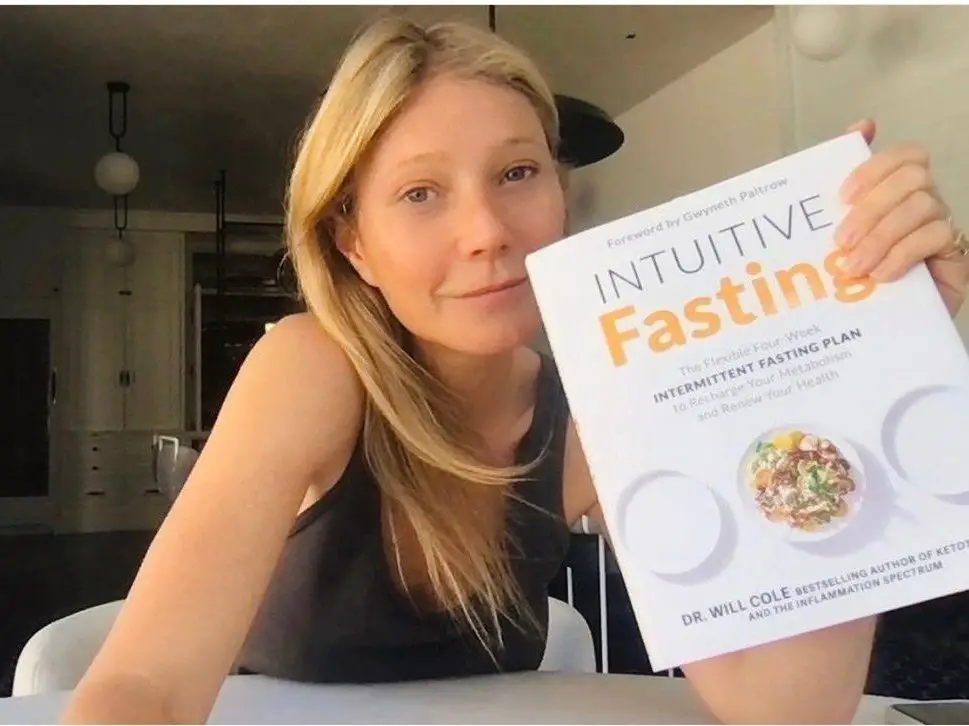Actress Gwyneth Paltrow has recently promoted Dr. Will Cole’s book “Intuitive Fasting: The Flexible Four-Week Intermittent Fasting Plan to Recharge Your Metabolism and Renew Your Health,” which has already elicited serious backlash.
Dr. Cole released this treacherous, slippery slope of a book in February, and Paltrow contributed by writing the foreword, making overarching claims such as, “When I eat what feels right to me, I feel my best,” and, “This is not a book of dogma. It will not punish you or restrict you.” She added, “The newfound understanding of what your body is asking for and how you can respond, it becomes doable—and, I’d go so far as to say, exhilarating.”
Dr. Cole defines intuitive fasting as a combination of intermittent fasting, where participants restrict their eating to certain hours of the day, or even certain days of the week, and intuitive eating, where participants follow their hunger signals and eat when they’re hungry. These two ideas contradict each other, as only having certain windows to eat innately limits said hunger cues.
Kenzie Brenna, an influencer and advocate for eating disorder survivors, highlighted this contradictory title. She noted, “Naturally, people are pissed at this because there is no such thing as ‘intuitive fasting’ and it’s co-opting a body of work known as ‘intuitive eating.’” Dr. Cole’s book is ultimately about intermittent fasting, as intuitive eating becomes impossible when there are restrictive eating windows in place.
https://www.instagram.com/p/CLwkL-uAWKJ/
What Paltrow and Dr. Cole fail to realize is that the intermittent fasting that they are marketing to the masses isn’t feasible for everyone; in fact, it’s flat out dangerous for most people — especially individuals recovering from eating disorders and individuals with a higher proclivity to develop an eating disorder.
Why Intermittent Fasting Is Dangerous
Intermittent fasting is so dangerous because it can permanently damage people’s relationships with food. By only eating at certain windows during the day, people are, in essence, disconnecting from their body’s natural hunger signals. As Alissa Rumsey, an NYC-based dietitian, noted, intermittent fasting “causes people to disregard hunger cues, which then means once they are allowed to eat, they are starving, and it can be hard to stop eating.”
Experts are additionally concerned about the lasting impact that restrictive eating will have on people’s internal clocks — and, by extension, their health as a whole.
“Restricting your eating to only certain times during the day ignores your body’s needs, leaves you undernourished, and could cause the pendulum to swing to the other extreme once you do have permission to eat,” Emily Fonnesbeck, a nutritional therapist, told Bustle. “This type of dysregulated, haphazard and chaotic eating pattern negatively impacts hormone balance, immunity, digestion, and sleep patterns. While intermittent fasting may appear healthy, it has the very real potential to make you unwell.”
Restricting your eating patterns in such a fashion can also trigger a cycle of bingeing and fasting, which is especially dangerous for eating disorder survivors as well as for individuals with a proclivity to develop an eating disorder — whether due to genetic or biological disposition, perfectionism, past abuse/trauma, body dissatisfaction or other factors.
“Intermittent fasting can damage your relationship with food by putting you into a restrict-binge cycle,” explained Christy Harrison, an expert on disordered eating. In a similar vein, Harrison recognized that restrict-binge cycles “can lead to full-blown anorexia, which affects people of any size.” Both mentally and physically, most bodies are not meant to withstand starvation patterns and windows.
The Public’s Backlash
Not only have multiple medical and mental health specialists criticized “Intuitive Fasting,” but so has the public. There were some evocative comments left on Paltrow’s Instagram post promoting the book. “Gwyneth honey this ain’t it”, said Instagram user nutellawithaspoon. “Starve yourself but make it ~intuitive~” said another user, sitwithwhit.
The public is rightfully angry that yet another celebrity is spreading misinformation about what is “healthy” and “safe” for the masses to put into their bodies and when. Kenzie Brenna explained that in an increasingly socialized world, it’s vital to continue discussing “how to discern between bullsh*t and truth, how to combat misinformation and how to develop our own critical thinking to make confident decisions on what is crap vs what isn’t.”
Paltrow’s Past With Spreading Misinformation
This isn’t Paltrow’s first rodeo with spreading misinformation. Last year, she released a Netflix series titled “Goop,” which Simon Stevens, chief executive of the NHS in England, claimed were a “considerable health risk” to its viewers. Throughout “Goop,” Paltrow explores alternative wellness methods with multiple doctors. Stevens described these methods as “dodgy procedures.”
Some of these procedures include the diagnosis and treatment of a parasite that is probably destroying you, advertising a psychic vampire repellent as well as testing vampire facials — which draws the platelet-rich plasma from a patient’s own blood and needles it into their face.
A fancy jade vaginal rock is supposed to prevent a person’s uterus from sagging, make their periods more regular and balance hormone levels — Paltrow’s brand, Goop, was sued for this false claim in 2018, and they had to pay $145,000 in a civil settlement.
What Needs To Change
Although these dubious health and wellness procedures seem ludicrous, Paltrow used her platform to mass-advertise them, thus showing that her recent promotion of “Intuitive Eating” is anything but random. Rather, Paltrow has been following a steady misinformation trajectory.
Given their platform, celebrities have the power to inspire the masses — in good ways, but also in negative ways that have the potential to spread harm. By supporting and advertising the already best-selling diet book “Intuitive Fasting,” Paltrow has used her platform for harm, even if it was unintentional. It’s vital that we make a change for the health and safety of the general public. Celebrities must start being held accountable — Paltrow included.

















